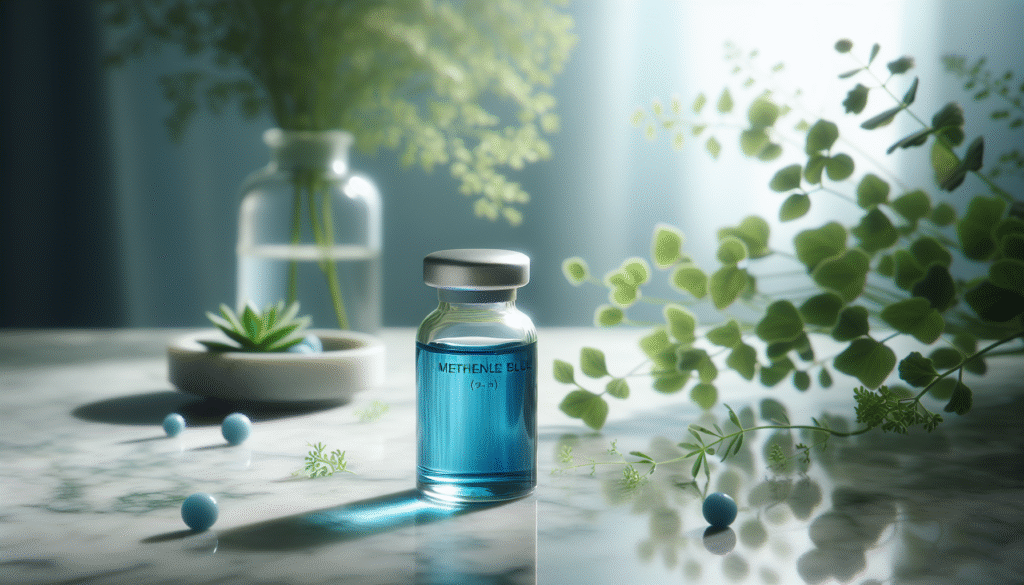
Have you considered how your choices today might influence your health tomorrow? As the desire to age gracefully gains momentum in society, many are turning to supplements and compounds that promise longevity and vitality. One such compound, methylene blue, has drawn attention for its potential benefits in promoting cognitive function, cellular health, and overall well-being. But is it truly as versatile as some claim, or does the scientific evidence suggest otherwise?

What is Methylene Blue?
Methylene blue is a synthetic dye that has been in use for over a century. Initially developed as a textile dye, it has found applications in various medical fields, ranging from treatments for malaria to the management of methemoglobinemia, a condition that affects the blood’s ability to carry oxygen. Its multifaceted nature raises questions about its suitability as a therapeutic agent for aging.
Chemical Properties
Structurally, methylene blue is a phenothiazine derivative known for its deep blue color. It has a unique ability to cross the blood-brain barrier, a crucial feature for its potential neurological benefits. Understanding its chemical properties can shed light on how it interacts with the human body and its relevance in promoting health.
The Science Behind Methylene Blue
Research in the field of methylene blue is evolving, with new studies illuminating various mechanisms through which it may exert its effects. Here are the primary areas of interest:
Antioxidant Properties
Oxidative stress, caused by an imbalance between free radicals and antioxidants in the body, is a significant contributor to aging. Methylene blue has demonstrated antioxidant capabilities, suggesting that it may help protect cells from damage.
How It Works
Methylene blue facilitates the production of adenosine triphosphate (ATP), the energy currency of cells. By enhancing mitochondrial function, it reduces oxidative stress and aids in cellular repair. This mechanism is vital for maintaining cellular health as one ages.
Neuroprotective Effects
Another essential benefit associated with methylene blue is its neuroprotective properties. Cognitive decline is a common concern, especially as you age. Research indicates that methylene blue may enhance mitochondrial function in brain cells, potentially improving memory and overall cognitive function.
Evidence from Studies
In animal studies, methylene blue has shown promise in preventing neurodegenerative diseases like Alzheimer’s. While research in humans is ongoing, preliminary findings suggest that it may help preserve cognitive function through its antioxidant effects and energy support.
Anti-Aging Properties
The allure of methylene blue as an anti-aging agent is rooted in its ability to promote cellular health and longevity. By mitigating oxidative stress, enhancing mitochondrial function, and supporting neuronal health, methylene blue offers a multifaceted approach to addressing the aging process.
Possible Applications in Aging
Aging is a complex process influenced by various factors, including genetics, lifestyle, and environmental exposures. Methylene blue has potential applications in addressing signs of aging at multiple levels, from skin health to cognitive function.
Skin Health
Skin aging is often characterized by wrinkles, dryness, and loss of elasticity. Methylene blue may have a role in skincare through its antioxidant properties, protecting skin cells from UV damage and oxidative stress. Some formulations are harnessing its benefits to improve skin texture and overall appearance.
Dosage and Administration
Before considering methylene blue as a supplement for aging gracefully, understanding the appropriate dosage and methods of administration is crucial.
Recommended Dosage
Emerging research suggests that low doses of methylene blue (approximately 0.5 to 4 mg/kg) may be effective for enhancing cognitive function and cellular health. However, exact dosages can vary based on individual conditions and needs.
Forms of Methylene Blue
Methylene blue is available in several forms, including pills, liquid solutions, and injectable forms. Each form has its applications and considerations for use:
| Form | Description | Common Use |
|---|---|---|
| Oral Tablets | Convenient dosage form for daily use | General supplementation |
| Liquid Solution | Allows for precise dosing; can be mixed | Customizable intake based on need |
| Injectable Solution | Typically used in clinical settings only | Specific medical treatments |
Safety Considerations
While methylene blue shows promise, it is essential to consider potential risks and side effects associated with its use.
Side Effects
Common side effects may include discoloration of urine, gastrointestinal upset, and headache. In rare cases, more serious reactions like serotonin syndrome can occur, especially when combined with certain medications.
Drug Interactions
Methylene blue can interact with medications, including antidepressants and certain anesthetics. Consulting with a healthcare provider is imperative before starting methylene blue, particularly if you are taking other medications.

Current Research and Future Directions
As interest in methylene blue grows, so does the body of research examining its potential benefits and applications. Clinical trials are ongoing to assess its efficacy and safety for various conditions.
Notable Studies
Recent studies have explored methylene blue’s effects on cognitive impairment and its potential to enhance mitochondrial function across several age-related conditions. Initial results are promising, but more extensive clinical trials are necessary to confirm its benefits and establish protocols.
Future Potential
Methylene blue’s versatility in addressing various aging-related issues places it at the forefront of research for innovative solutions in health and wellness. As science advances, it is plausible that this compound will find new applications in other areas, including metabolic disorders and general vitality.
Philosophical Consideration of Aging
Beyond the biological aspects of aging, it is worth pondering the philosophical implications of seeking anti-aging solutions. Aging is an inevitable part of life, and the quest for maintaining youthfulness often leads to deeper self-reflection on what it means to age gracefully.
Accepting Aging
Embracing aging means acknowledging the wisdom, experience, and personal growth that accompany each year. While compounds like methylene blue may assist in promoting health, true grace in aging involves a balanced approach to physical, emotional, and psychological well-being.
Holistic Approach to Aging
In addition to considering compounds like methylene blue, adopting a holistic approach to aging involves incorporating a balanced diet, regular exercise, stress management practices, and social connections. These elements are fundamental to a well-rounded strategy for aging gracefully.
Conclusion: The Path Ahead
Methylene blue presents an intriguing option for those interested in promoting health as they age. While its multifaceted properties may contribute to better cognitive function, cellular health, and even skin appearance, it is crucial to approach its use with caution and a commitment to overall wellness.
Ultimately, the journey of aging gracefully is about more than just seeking out the latest compound or treatment. It involves cultivating a lifestyle that fosters health, well-being, and a sense of fulfillment regardless of age. As you navigate this process, consider the potential role that methylene blue may play, but remember to ground your efforts in a holistic view of wellness.